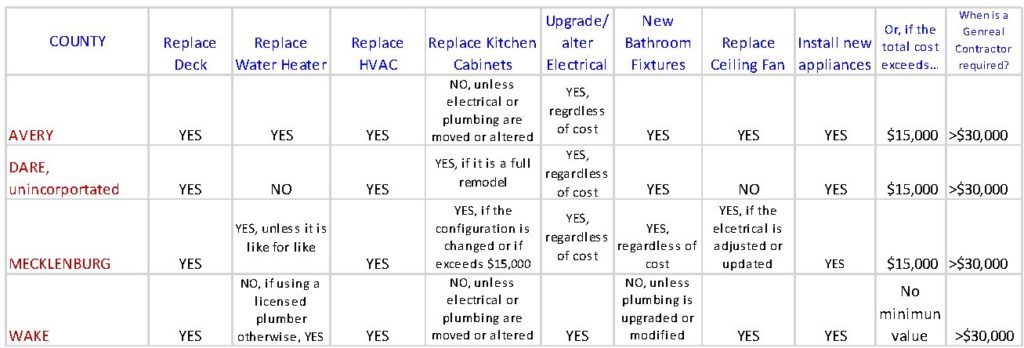Building Permits – A Broker’s Responsibility
The requirements for obtaining building permits for original construction, additions, renovations, and repairs are determined by county and/or municipal building inspection offices. These requirements can be complex, may change over time, and may be different from one county/city to another. Brokers are not expected to know or remember all of the requirements for obtaining building permits. However, brokers have a duty to disclose material facts and part of fulfilling that duty is verifying information – including permitted or non-permitted changes.
When a broker lists a new home for sale, the broker should ask the builder for a copy of the Certificate of Occupancy (aka “CO”) and give a copy of it to the buyer or buyer’s agent. The issuance of a CO confirms that the builder obtained the necessary building permit(s) in advance, that the house/building was fully inspected by the building inspections office during its construction, and that its construction complies with the building code. If a CO is not yet available, then the seller’s agent should disclose this fact to a prospective buyer and ensure that the buyer receives a copy of the CO at or before the closing.
When brokers list properties for sellers, especially properties being flipped, the brokers should inquire about all of the renovations, additions and repairs their seller-clients have made. The brokers should make a good faith effort to obtain copies of vendor invoices from the sellers referencing the work that was done, when, and by whom. The brokers should then contact their local building inspection offices to inquire whether permits and/or occupational licenses were required, whether permits were pulled and, if so, obtain copies of the permits. If a broker discovers that the seller failed to obtain a required permit or failed to hire a licensed professional when a license was required, then this is a material fact that the broker must disclose to all prospective buyers, even if the seller chooses not to disclose it.
This same requirement holds true when brokers renovate, add on to, or repair their own properties as flippers or owner-occupants. The broker must obtain all required permits and hire licensed professionals when it is required. If the broker fails to do so, it is a material fact which the broker-seller must disclose to all prospective buyers (or their agents).
N.C.G.S. §160D-1110 (c) states that no permit is required for any construction, installation, repair, replacement, or alteration performed in accordance with the current edition of the North Carolina State Building Code costing fifteen thousand dollars ($15,000) or less in any single-family residence unless the work involves any of the following: (1) The addition, repair, or replacement of load-bearing structures. (2) The addition or change in the design of plumbing. (3) The addition, replacement, or change in the design of heating, air-conditioning, or electrical wiring, devices, appliances, or equipment, other than like-kind replacement of electrical devices and lighting fixtures. (4) The addition (excluding replacement) of roofing. A local government shall not require more than one building permit for the complete installation or replacement of any natural gas, propane gas, or electrical appliance on an existing structure when the installation or replacement is performed by a person licensed (otherwise, a permit is required). The following chart illustrates a few common renovations performed on properties in a small sample of North Carolina counties. A “YES” indicates that a permit is required for that particular renovation. You may be surprised at the types of updates that require permitting, so be careful!

Flipping homes has become a common practice in North Carolina. Flippers sometimes emphasize cosmetic improvements that greatly enhance the appearance of their properties, and unfortunately, saving money on these improvements is often a priority. If an owner replaced an HVAC system, water heater, wiring, plumbing or other systems, then one or more building permits may have been required and the person who made those replacements was likely required to be licensed in their fields. Flippers sometimes hire unlicensed handymen to perform services that require licenses. Hiring a licensed contractor may raise the cost of the repair or improvement but will also help an owner or flipper navigate permitting requirements and help ensure that the improvements are satisfactory. Brokers should educate themselves, to be alert, and must inquire about improvements to ensure that they discover and disclose material facts.